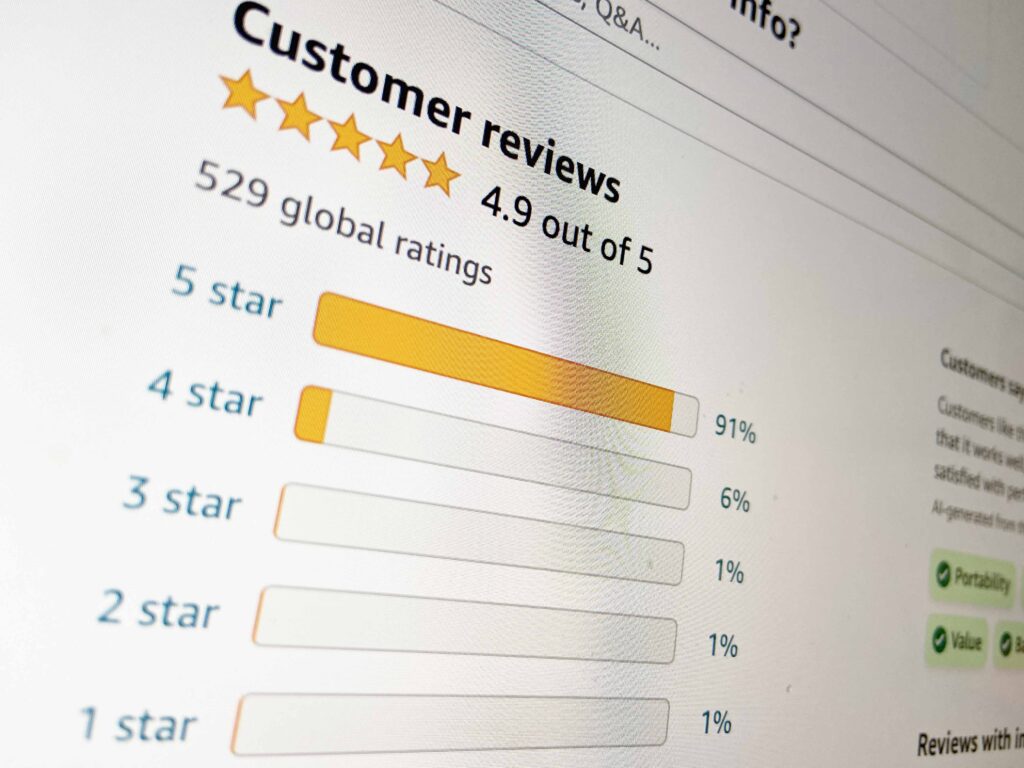The Librarian Lens is an occasional column featuring librarians who support the research lifecycle across a range of disciplines sharing research tips, updates about both Libraries-provided and open source resources, and related topics intended to intrigue, demystify and highlight topics of interest to the research-curious. Posted columns are provided or curated by librarians from the University of Texas Libraries STEM and Social Science Engagement Team.
Customer reviews data are what you look at when you’re deciding which product to buy, which restaurant to eat at, or which hotel to reserve. The data consists of star ratings and the written or video reviews from customers. Most people consult customer review data when making online purchasing decisions.
Customer reviews are also considered a form of advertising. In advertising lingo, customer review data is known as “electronic word of mouth,” meaning it comes from a customer’s experience, not the manufacturer or service provider. Traditional “word of mouth” advertising, especially from people we know, is the most trusted form of advertising. Electronic word of mouth can also influence purchase behavior. Academic researchers have measured that influence and concluded that the most trustable and influential reviews are those that are high quality, i.e., they contain a lot of detail and the reviewer posts regularly.
However, is trusting reviews from people we don’t know a good idea? Like the answer to many questions involving human-centered behaviors, the answer is, it depends.
On its face, customer review data is a compilation of crowd sourced wisdom. If we believe that people are genuinely reporting their experience with the product or service, then why not rely on customer review data?
Guilt
There are many reasons why people don’t always give their honest opinions in a review. They may feel guilty about leaving a poor review. This is common for services such as ridesharing or house rentals in which a consumer’s written opinion can impact the service provider’s ability to earn income. It also happens because service providers can review the consumer. No one wants to be labeled as difficult. These reviews are not always reliable.
Distraction/Hidden Agenda
Other reasons for consumers not giving honest reviews may be unrelated to their experience with the product or service. They could be hungry or in a hurry or they may not read the product’s instructions. Or they could have a political disagreement with the company. There is no way for you as a consumer to know about these conditions unless you research the reviewer and check their other reviews. You may not have time for this kind of investigation.

Expertise
Another reason to consider not using customer review data is because people leaving the reviews may not be experts in the field. In fact, most reviews are from people who do not have special expertise. You may have noticed this in movie reviews. Film critics review films differently from most people, such as in the case the Netflix show Squid Game: The Challenge. This is why it is interesting to look at a site like Rotten Tomatoes which contains reviews from both experts (Tomatometer) and regular folks (Audience Score).
In situations in which you are not spending a large amount of money, it may not matter all that much what the reviewers write. After all, how much difference is there between one type of hand lotion and another? More details help. The reviewer could write I live in a dry environment, and this product improved my skin’s texture. This why sites that sell clothing often ask reviewers to fill in other criteria such as age and body type so that you can try to choose a reviewer that matches you so that you can use their review to make your best guess about whether to make a purchase.
If you are spending a large amount of money, or procuring something for a child, it’s a good idea to use expert reviews. For investment advice or car purchases, please turn to the folks who work in this field. Or for safety considerations for items such as car seats or booster seats, consult the National Highway Traffic Safety Administration. For technical products, such as hardware or networking equipment, use sources such a CNET or PC Magazine.
Another consideration is durability. Some organizations, such as Consumer Reports and Wirecutter are testing experts. They don’t specialize in a particular industry, but they have expertise in testing. For home products such as microwaves or washing machines, it’s a good idea to read reviews from these organizations, because they’ve done the kind of tests where they’ve held a watch under water for 8 hours, or slammed an oven door repeatedly, unlike the regular consumers who post reviews to Best Buy or Lowes.
Fake Reviews
In a recently published article, New York Times reporter Stuart A. Thompson said that fake reviews are so pervasive that nearly every online shopper has most likely encountered one. Amazon blocked more than 200 million suspected fake reviews last year and Google said it removed 115 million rule-breaking reviews from Maps in 2022. It is an on-going problem. In some case, people are paid to write fake reviews, so the reviews are coming from individuals, not bots. Sometimes fake review writers are given a script to use, so searching for a phrase that comes up repeatedly could indicate a fake review.
Artificial Intelligence
Artificial Intelligence, or AI could help or hinder the fake review problem. You may have noticed that Amazon now provides summaries of reviews for products. If you click on Reviews, there’s a section that says “Customers say” which summarizes comments about product attributes. In small text beneath the summary paragraph, it says “AI generated from text of customer reviews.” It’s likely that fake reviews are included in this collection, and that skews the summary to be more positive, since fake reviews are almost always positive. One way to combat this is to read the negative reviews.
Customer Review Data was the subject of a UT Libraries’ Data & Donuts Workshop in October 2023. Please link to the Zoom recording for more information on customer reviews.


